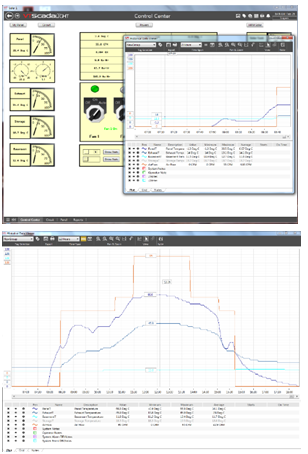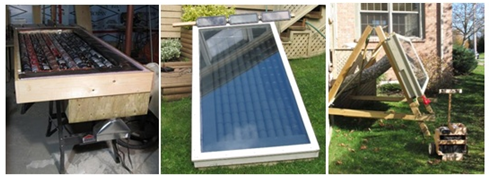While VTScada continues to increase in popularity in the industrial market, VTScadaLIGHT, the new, free, 50-tag version of VTScada, brings enterprise-grade SCADA software and analytics to the IOT and hobbyist market.
One example of how VTScadaLIGHT can take a hobbyist project to the next level is a solar collector completed by Ray, an early adopter in Nova Scotia, Canada. Using VTScadaLIGHT and a Jazz PLC, Ray developed a simple program to control and monitor a pop-can solar array which he is using to supplement his home heating needs.
“Pop-can solar,” you ask? Basically, pop cans with the tops and bottoms punctured are glued into vertical stacks and painted flat black. These stacks are placed in a frame with a glass window. Ducts, to-and-from the areas to be heated, are added at the bottom and top of the frame.
To improve temperature control, Ray added a small fan to regulate airflow from the solar heater frame. That fan is powered by small photovoltaic solar cells mounted to the top of his panel. Since the fan is only needed when the sun is out, PV cells work perfectly for fan power.
Though this solar cell is designed to passively provide heat when the sun is shining, adding a SCADA component allows Ray to gather information that helps him to optimize performance. Even in the summer, when heating isn’t required, Ray benefits from the collector’s ability to remove humidity from his basement.
Displaying this information is simple using VTScadaLIGHT’s integrated components which include a Modbus driver, a graphical display editor, an historian, and data logger. The built-in calculation tags allowed Ray to characterize the airflow and temperature into units of energy to determine how much his panel is saving him over a year or to compare performance year-after-year.
Additionally, Ray can manually control his solar heater and configure alarms, in case equipment should malfunction.
Where do we expect Ray to take his application in the future? It’s this writer’s guess that Ray will eventually tie in the recently included JSON and XML driver. This will allow him to connect to weather websites such as OpenWeatherMap.org to collect and trend current and forecast weather information alongside his solar performance data.
Now that you’ve read how VTScadaLIGHT was able to help Ray save some cash, and the environment, let us know how VTScadaLIGHT can help you. Email us to tell us your story or to find out more about VTScada and the free VTScadaLIGHT.
| Try VTScadaLIGHT For Yourself No email or registration required. |
For More Details Dave Spencer 902.832.6153 David.Spencer@Trihedral.com |
Are you curious about building your own pop-can solar heater?
This article explains the process. http://www.instructables.com/id/How-to-Build-a-Soda-Can-Heater/

